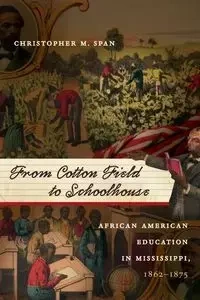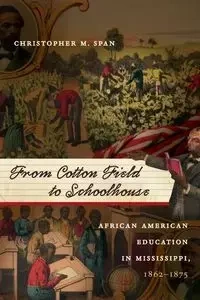From Cotton Field to Schoolhouse - Christopher M. Span
From Cotton Field to Schoolhouse - Christopher M. Span
- African American Education in Mississippi, 1862-1875
AutorzyChristopher M. Span
The primary debate centered on whether schools for African Americans (mostly freedpeople) should seek to develop blacks as citizens, train them to be free but subordinate laborers, or produce some other outcome. African Americans envisioned schools established by and for themselves as a primary means of achieving independence, equality, political empowerment, and some degree of social and economic mobility--in essence, full citizenship. Most northerners assisting freedpeople regarded such expectations as unrealistic and expected African Americans to labor under contract for those who had previously enslaved them and their families. Meanwhile, many white Mississippians objected to any educational opportunities for the former slaves. Christopher Span finds that newly freed slaves made heroic efforts to participate in their own education, but too often the schooling was used to control and redirect the aspirations of the newly freed.
EAN: 9781469622217
Symbol
118GHM03527KS
Rok wydania
2014
Oprawa
Miekka
Format
15.6x23.4cm
Język
angielski
Strony
270

Bez ryzyka
14 dni na łatwy zwrot

Szeroki asortyment
ponad milion pozycji

Niskie ceny i rabaty
nawet do 50% każdego dnia
Niepotwierdzona zakupem
Ocena: /5
Symbol
118GHM03527KS
Kod producenta
9781469622217
Rok wydania
2014
Oprawa
Miekka
Format
15.6x23.4cm
Język
angielski
Strony
270
Autorzy
Christopher M. Span

In the years immediately following the Civil War--the formative years for an emerging society of freed African Americans in Mississippi--there was much debate over the general purpose of black schools and who would control them. From Cotton Field to Schoolhouse is the first comprehensive examination of Mississippi's politics and policies of postwar racial education.
The primary debate centered on whether schools for African Americans (mostly freedpeople) should seek to develop blacks as citizens, train them to be free but subordinate laborers, or produce some other outcome. African Americans envisioned schools established by and for themselves as a primary means of achieving independence, equality, political empowerment, and some degree of social and economic mobility--in essence, full citizenship. Most northerners assisting freedpeople regarded such expectations as unrealistic and expected African Americans to labor under contract for those who had previously enslaved them and their families. Meanwhile, many white Mississippians objected to any educational opportunities for the former slaves. Christopher Span finds that newly freed slaves made heroic efforts to participate in their own education, but too often the schooling was used to control and redirect the aspirations of the newly freed.
EAN: 9781469622217
The primary debate centered on whether schools for African Americans (mostly freedpeople) should seek to develop blacks as citizens, train them to be free but subordinate laborers, or produce some other outcome. African Americans envisioned schools established by and for themselves as a primary means of achieving independence, equality, political empowerment, and some degree of social and economic mobility--in essence, full citizenship. Most northerners assisting freedpeople regarded such expectations as unrealistic and expected African Americans to labor under contract for those who had previously enslaved them and their families. Meanwhile, many white Mississippians objected to any educational opportunities for the former slaves. Christopher Span finds that newly freed slaves made heroic efforts to participate in their own education, but too often the schooling was used to control and redirect the aspirations of the newly freed.
EAN: 9781469622217
Niepotwierdzona zakupem
Ocena: /5
Zapytaj o produkt
Niepotwierdzona zakupem
Ocena: /5
Napisz swoją opinię

